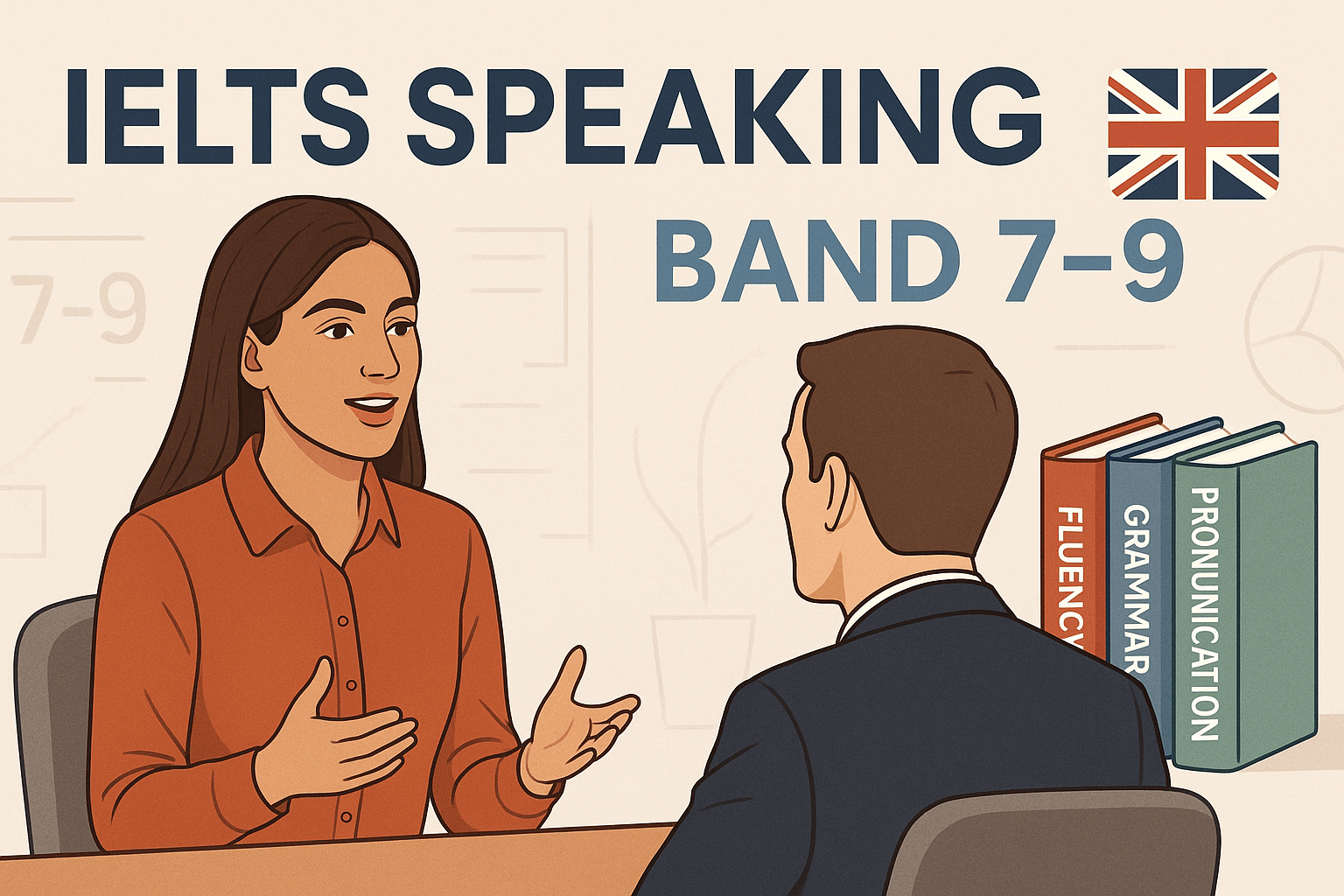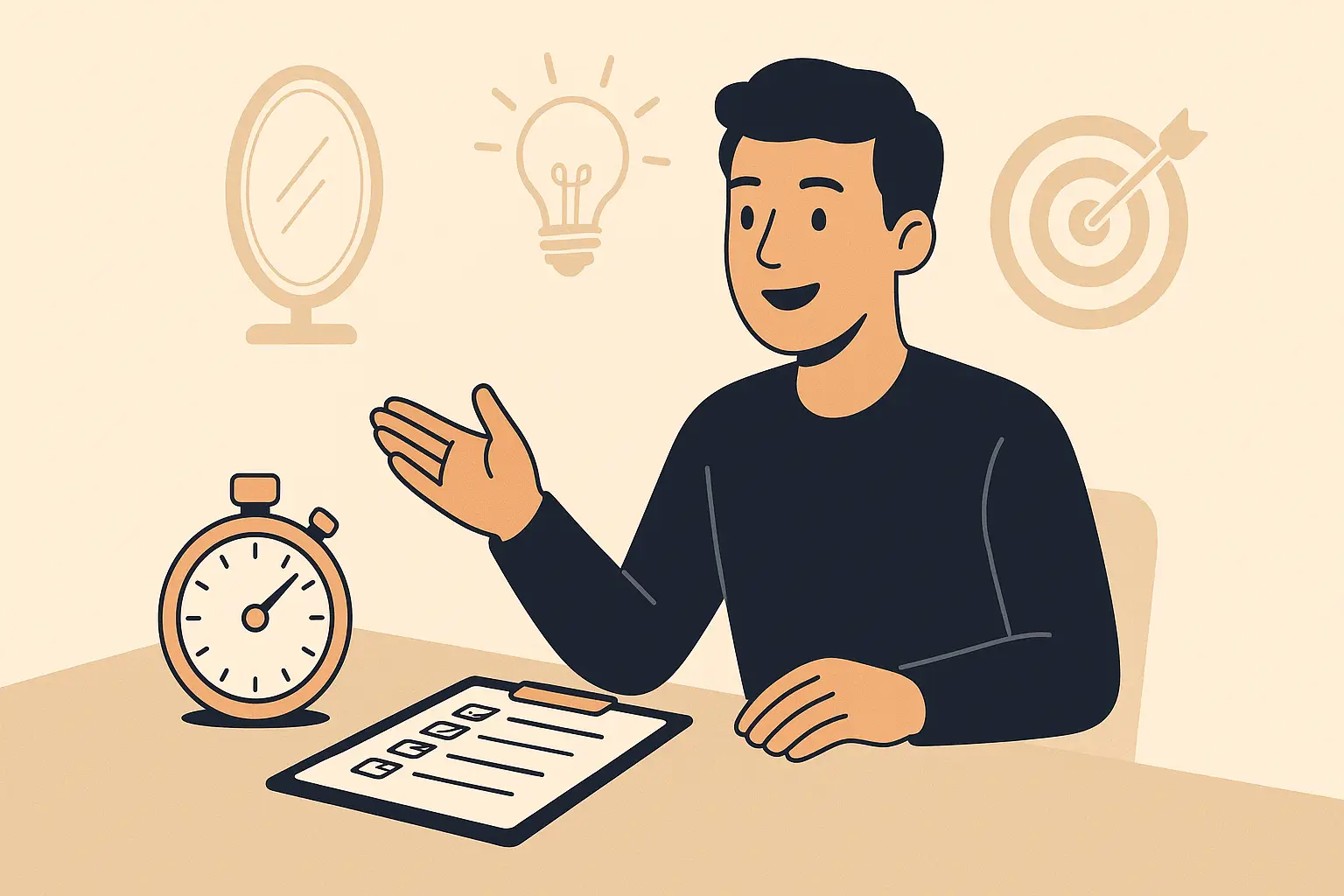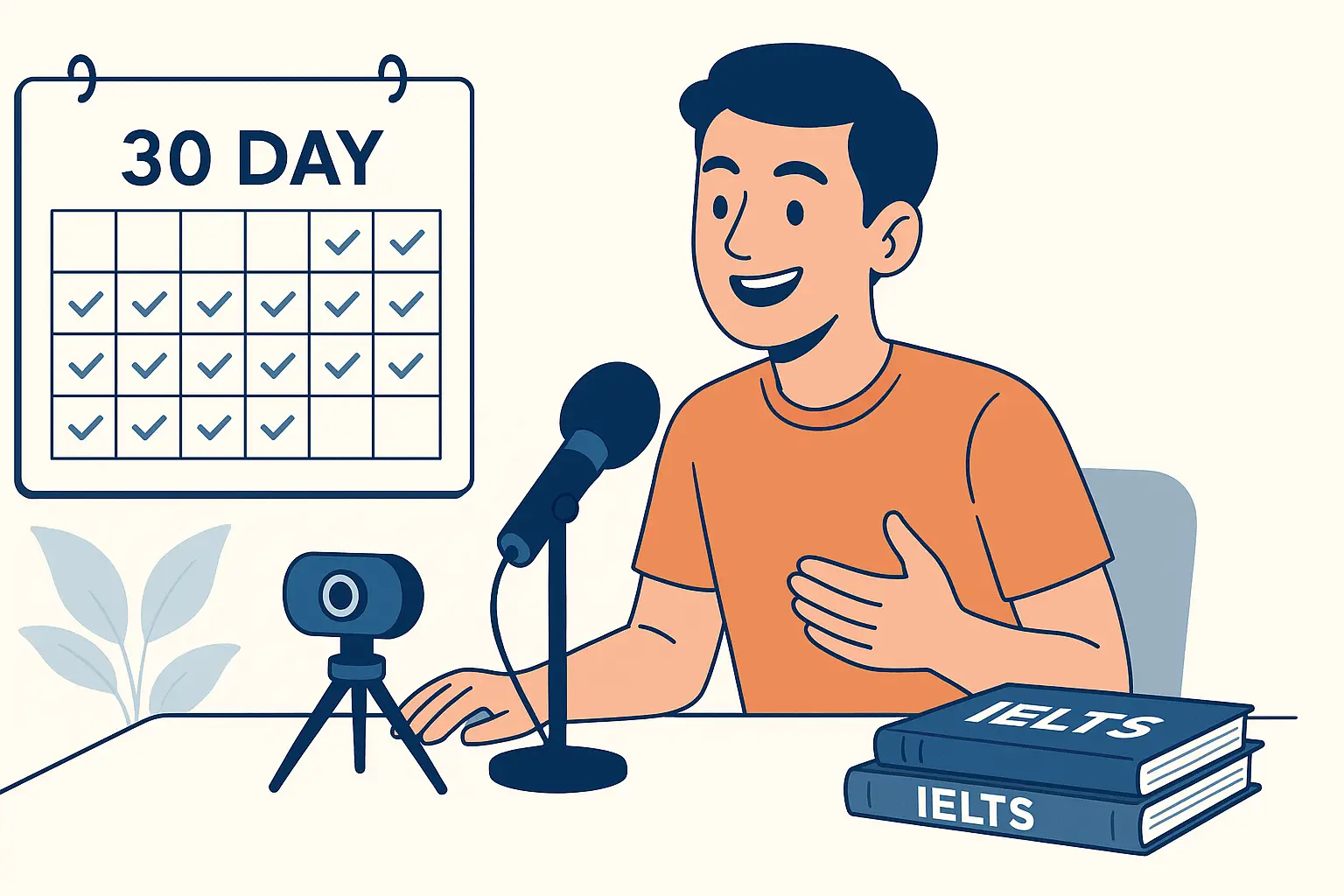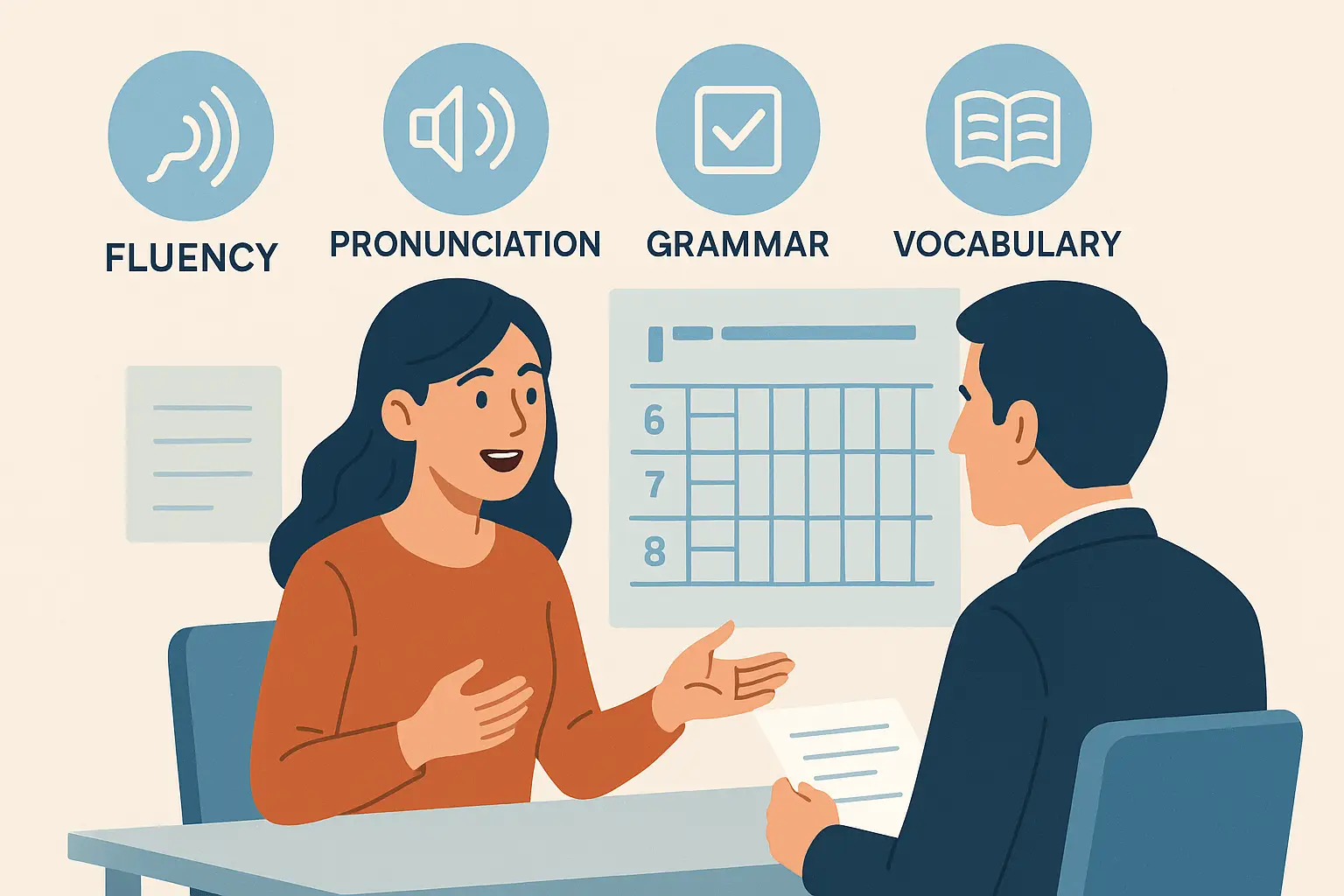If you’re aiming for Band 7, 8, or even 9 in the IELTS Speaking test, you’re in the right place. As an international IELTS teacher who has helped students from over 30 countries, I’ve seen every kind of challenge, every nervous mistake, and every breakthrough moment. This guide brings all of that experience together — from understanding the format to fixing fluency issues — so you can walk into your IELTS Speaking test confidently and walk out with the score you deserve.
What is the IELTS Speaking Test?
The IELTS Speaking test is a face-to-face interview that lasts between 11–14 minutes. It’s structured into three parts:
- Part 1: Introduction and general questions about you (4–5 minutes)
- Part 2: A one-minute prep followed by a 1–2 minute speech on a given topic (cue card)
- Part 3: A two-way discussion with more complex questions related to Part 2
It’s the same for both Academic and General Training candidates. You’ll be assessed in four areas: Fluency and Coherence, Lexical Resource, Grammatical Range and Accuracy, and Pronunciation — all of which we’ll break down below.
For a full breakdown of each part and how to approach them, I explain strategies in detail in this post on IELTS Speaking format and structure.
IELTS Speaking Band Descriptors: Simplified and Explained
Understanding how your speaking is scored is half the battle. Let me simplify the four key criteria:
🔹 Fluency and Coherence
This is about how naturally you speak. You should be able to express ideas smoothly, without long pauses, repetitions, or self-correction. I had one student who always paused after every sentence — once we practiced connecting ideas using discourse markers like “however” and “in fact,” their fluency improved drastically.
🔹 Lexical Resource (Vocabulary)
You’ll need a wide range of topic-specific vocabulary — but not too formal or memorised. If you tend to repeat basic words like “good,” “bad,” or “very,” this vocabulary booster guide will help expand your expressions naturally.
🔹 Grammatical Range and Accuracy
This measures your sentence variety and correctness. Can you use both simple and complex sentences accurately? One of my students jumped from Band 6.5 to 7.5 after practising with our targeted grammar correction approach, which I explain here in the grammar and fluency guide.
🔹 Pronunciation
This doesn’t mean having a British or American accent. It means you are clearly understood, with correct word stress, intonation, and rhythm. Mispronunciation of words like “comfortable” or “vegetable” is surprisingly common — we address these patterns in this detailed fluency and pronunciation resource.
For official scoring reference, you can review the IELTS Speaking band descriptors from the British Council.
Common IELTS Speaking Mistakes (and How to Fix Them)
Here are some of the most frequent mistakes I’ve seen — and how we solve them in class:
- Short, underdeveloped answers: Many students give yes/no responses in Part 1. Always explain why or add a short example.
- Memorised templates: Examiners can spot these instantly. Use flexible phrases, not rigid scripts.
- Monotone delivery: No ups and downs in your voice? That hurts your pronunciation score. Practice using rising intonation for questions and emotion to sound natural.
- Using filler words too often: Saying “umm… like… you know…” repeatedly breaks fluency. Record yourself to become aware of this.
If you’ve been making any of these errors, this guide to common speaking mistakes and how to practice offers solutions I’ve used with my own students — with real improvement results.
Preparation Tips & Step-by-Step Improvement Plan
You don’t need to be “naturally fluent” in English to get a high score. You need the right plan.
📌 Step 1: Learn the Test Format
Start by understanding the parts, time limits, and types of questions. I recommend reviewing the official IELTS site or IDP’s IELTS overview.
📌 Step 2: Record Yourself Daily
Pick a Part 1 or 2 topic. Set a timer. Record. Listen. Then try again. You’ll notice hesitation, repeated words, or weak pronunciation.
📌 Step 3: Fix Weak Areas One by One
If vocabulary is your issue, go through this speaking vocabulary post. If fluency is the block, this fluency strategy guide will help. Work on one problem at a time — not all at once.
📌 Step 4: Practice With Real Topics
Use Cambridge practice tests or join speaking clubs. I often assign mock interviews between students, where one plays the examiner. It builds confidence.
📌 Step 5: Get Feedback (Not From AI)
Real human feedback matters. If you don’t have a teacher, record and send your answers to a tutor or peer who knows IELTS standards.
Sample Answers That Score Band 7–9
Students always ask me: “What does a Band 9 answer sound like?” I always say: it’s not perfect — it’s natural, clear, and full of ideas.
Take this cue card:
Describe a time you helped someone.
Band 6 answer:
“I helped my friend with study. He was nervous. I gave him book. Then he was happy.”
Band 8+ answer:
“A few months ago, I helped a friend prepare for a university interview. He was feeling quite anxious, so I spent a couple of evenings helping him practice common questions. We also worked on his body language, and thankfully, he got accepted!”
What made the difference? Detailed ideas, fluent structure, emotional connection, and varied grammar.
I go deeper into answer modelling and strategy breakdowns in our lesson-based blog on IELTS Speaking practice and strategies.
FAQ: IELTS Speaking Questions Answered
Q1: Do I need a British or American accent to score high?
Not at all. You’re scored on clarity, not accent. As long as you’re understandable, your pronunciation will meet the criteria.
Q2: Can I ask the examiner to repeat a question?
Yes, absolutely. Just say, “Could you repeat that, please?” It won’t affect your score.
Q3: Is using high-level vocabulary necessary?
Not high-level — appropriate and precise. Saying “essential” instead of “very important” helps, but only if used naturally.
Q4: Should I speak quickly to sound fluent?
No — fluency isn’t speed. Speak at a natural pace with logical flow. Pausing too much or speaking too fast can lower your score.
Q5: Can I lie in my answers?
Yes. IELTS is not a truth test. Just make sure your story is coherent and fits the question.
Final Thoughts
The IELTS Speaking test is a unique challenge — but with the right understanding, strategies, and targeted practice, you can reach Band 7, 8, or even 9. I’ve seen students with very average spoken English improve in 4–6 weeks by following the same path you’ve read here.
Whether you’re struggling with fluency, vocabulary, or confidence, know that it’s fixable — one step at a time. Explore the linked guides across this post whenever you need a deep dive on a specific skill.
And remember: you’re not preparing for a test — you’re learning to communicate your thoughts clearly and confidently in English.
Good luck — and if you ever feel stuck, I’ve got more strategies waiting for you.






15 Responses